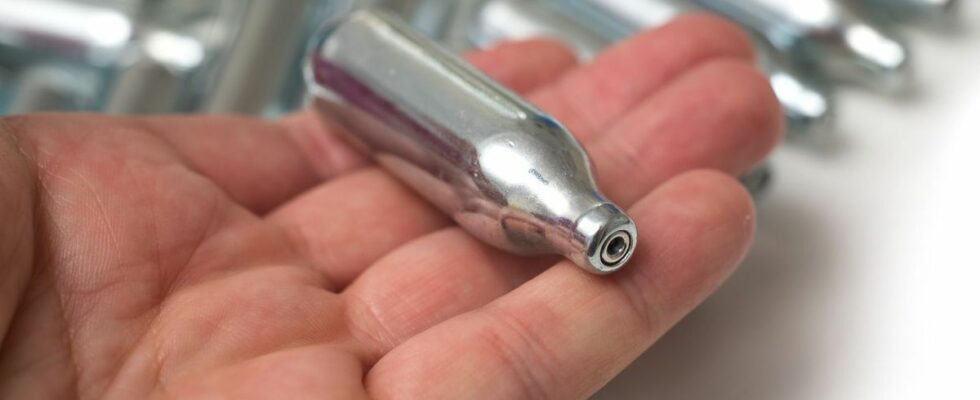Published on
updated on
Reading 3 min.
in collaboration with
Dr Gérald Kierzek (Medical Director)
The consumption of nitrous oxide has become commonplace in recent years, particularly among young people. However, it is not without health risks. Researchers at the Lille University Hospital are working to provide better care for patients who are victims of “proto”.
Psychiatric disorders, permanent paralysis, tingling… The consumption of laughing gas – nitrous oxide – is not without health risks. However, in recent years, the consumption of this gas, diverted for its euphoric effects, has exploded among young people, who use it for festive purposes.
Serious health consequences
While consuming laughing gas can make you laugh, it can also make you cry… In fact, nitrous oxide can cause serious health effects.
- Immediate risks from the first consumption: asphyxiation due to lack of oxygen, loss of consciousness, burns from the cold of the gas expelled from the cartridge, loss of cough reflex (risk of choking), disorientation, dizziness, risk of falling.
- Risks in case of chronic use or high doses: Due to the action of the gas on the central nervous system, repeated consumption at close intervals can cause side effects such as headaches and dizziness, but also more serious effects such as neurological damage, heart rhythm disorders, risk of asphyxiation, psychiatric disorders, etc.
Interviewed by our colleagues at France 3, Emeline Gernez, a medical biology intern at the Lille University Hospital, details her misdeeds.The neurological symptoms are varied: tingling, walking difficulties, paralysis with patients who end up in wheelchairs… We also have patients who will develop thrombosis or Stroke For example“. Without forgetting the consequences on the cardiac or psychiatric level and secondly, the road accidents that it generates, indirectly.
Two recent studies, conducted in France and the United Kingdom, analyzed cases of serious side effects from recreational use of nitrous oxide and confirm this finding. According to the journal Prescribe in its August 2024 issue, “Several hundred cases of myeloneuropathy have been reported, including gait disorders and sphincter disorders. Psychological, cardiac or hematological disorders have also been observed.”.
Researchers seek to identify biological markers of clinical severity
In an attempt to better care for patients, researchers at the Lille University Hospital are working to identify the molecules responsible for these effects on the health of laughing gas users. Through blood tests, the researchers are trying to identify biological markers. Because the molecule cannot be measured directly in the blood, as cannabis would be, for example. “The half-life of nitrous oxide is so short that we cannot measure the molecule directly; we have to use indirect markers, which are also less reliable.” reports Dr. Guillaume Grzych, head of the nitrous oxide network at Lille University Hospital. Their research, however, seems to be bearing fruit.
“Increased blood markers were observed in patients who had greater clinical severities.” “reports Emeline Gernez, whose work has been rewarded in the United States.”The results of this work thus make it possible to adapt the treatment protocol, particularly in terms ofmedical imaging“.
A national network set up in Lille
Faced with this growing scourge and the increase in the quantities inhaled through the consumption of gas canisters (equivalent to 300 individual cartridges), Lille doctors have set up a national network to train doctors on this subject, accessible at the address www.protoside.com“The site, created by our collective of doctors, is intended for the general public but also for health professionals” adds Guillaume Grzych. “The aim is to raise awareness of the dangers of nitrous oxide, to train health professionals on the subject, to inform patients…”
For Gérald Kierzek, emergency physician and medical director of Doctissimo ““We are not at all faced with a recreational, hilarious product without serious consequences”The doctor reminds that “the after-effects of its use are sometimes permanent with real paralysis For example”.
According to him, it is essential to ban its use, but also to inform the young population and parents about the risks.Finally, the development of research into the mechanisms involved is fundamental, in the face of this new and underestimated public health scourge.” he concluded.
What should people who consume it or witness someone else consuming it do?
- In case of emergency, call emergency services (15 or 112);
- If you experience any worrying symptoms after inhaling nitrous oxide, contact your Poison Control Center ;
- Report any serious cases of abuse, dependence or misuse of nitrous oxide to the website signalement-sante.gouv.fr ;
- If you have difficulty controlling and/or stopping your consumption in a context of misuse, consult a doctor or a structure specializing in the management of addictions, such as a ” young consumer consultation“which offers a free and confidential service of reception, listening, advice and, if necessary, guidance. All information is available on: www.drogues-info-service.fr.
Source: ANSM
